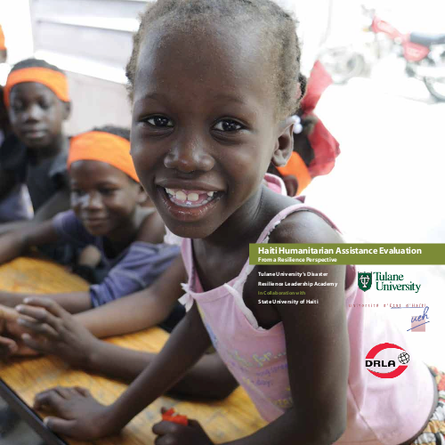From a Resilience Perspective

This report of the Haiti Humanitarian Assistance Evaluation of the 2010 earthquake that struck Haiti on January 12th was undertaken by Tulane University’s Disaster Resilience Leadership Academy in partnership with the State University of Haiti (UEH) and funded by the Bill & Melinda Gates Foundation.
The research process was dynamic, allowing the evaluation team to explore the theme of resilience and humanitarian assistance led by and between Haitians in stakeholder workshops in impacted communities. Guided by these discussions, the evaluation team developed a resilience framework based upon 7 dimensions of resilience (wealth, debt and credit, coping behaviors, human capital, community networks, protection and security, and psychosocial) and used primary data collected through a national household and community key informant surveys, to measure the relationship between the earthquake, Haitian resilience, and exposure to humanitarian assistance and resilience outcomes. Resilience outcomes were measured at the household and individual levels.
This evaluation found that humanitarian assistance provided by the national and international community did not make a detectable contribution as defined by the 7 dimensions of resilience and in some instances, may have been associated with undesirable outcomes. Furthermore, this evaluation demonstrates the importance of engaging the impacted community from the on-set of the disaster to lead strategy, policy, and implementation based upon a thorough understanding of resilience and coping mechanisms that should be integrated into humanitarian programming starting at the beginning and continuing through the recovery process.
The framework for measuring resilience defined and used in this evaluation can serve as a catalyst for future discussions related to Haitian resilience and to support and refine the monitoring and evaluation strategy for Haiti’s recovery. However, more resources are needed to strengthen Haitian capacity to further develop evaluation methods and metrics (particularly metrics that track resources through the value chains to Haitian end user organizations and beneficiaries) that will allow for a deeper understanding of resilience and provide evidence to support data driven programming. A major constraint of the evaluation was the inability of the evaluation team to capture fully and analyze resource flows and a reluctance of many aid organizations to assist in this effort. Strengthening capacity in this regard will allow Haitian public and private institutions to more easily track, analyze, and ultimately target and manage humanitarian and recovery assistance to promote resilient outcomes.
Finally, it is important to emphasize that the findings in the Haiti Humanitarian Assistance Evaluation reflect the views and perceptions of Haitians themselves and that the recommendations provided in this evaluation, serve to guide the people of Haiti, and their government, to more effectively partner with the international community to work towards a brighter and more resilient future.
Resource collections
- Evaluating humanitarian action
- Monitoring and Evaluation (M&E)
- Monitoring of humanitarian action
- UN Habitat - Urban Response Collection
- Urban Response - Urban Crisis Preparedness and Risk Reduction
- Urban Response Collection - Community Engagement and Social Cohesion
- Urban Response Collection - Economic Recovery
- Urban Response Collection - Environment and Climate Change
- Urban Response Collection - Housing, Land and Property
- Urban Response Collection - Urban Crisis Response, Recovery and Reconstruction
- Urban Response Collection - Urban Resilience
- Use of evaluation evidence